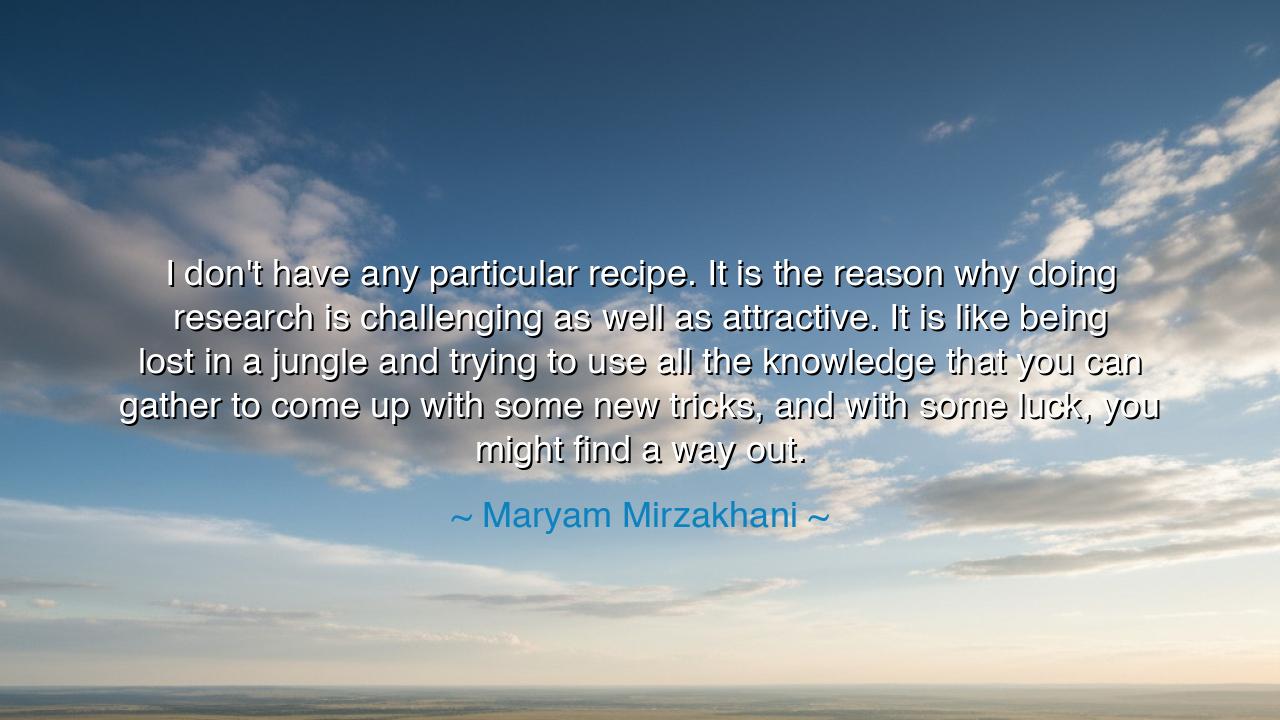
I don't have any particular recipe. It is the reason why doing
I don't have any particular recipe. It is the reason why doing research is challenging as well as attractive. It is like being lost in a jungle and trying to use all the knowledge that you can gather to come up with some new tricks, and with some luck, you might find a way out.






The words of Maryam Mirzakhani, the first woman ever to win the Fields Medal in mathematics, reveal the soul of a seeker when she said: “I don't have any particular recipe. It is the reason why doing research is challenging as well as attractive. It is like being lost in a jungle and trying to use all the knowledge that you can gather to come up with some new tricks, and with some luck, you might find a way out.” In this humble confession lies the truth of all discovery — that creation, in its purest form, is not a path paved by certainty, but a pilgrimage through mystery. The jungle she speaks of is the vast wilderness of the unknown, where reason meets chaos, and where the heart must lead when logic can no longer see.
To the ancients, such a struggle was not foreign. They too knew that the pursuit of truth is no straight road, but a labyrinth. Think of Archimedes, who spent years wandering the corridors of thought, searching for the principle of buoyancy. His cry of “Eureka!” was not a flash of divine luck, but the voice of a mind that had long wrestled with confusion. Like Mirzakhani, he found joy not in the possession of knowledge, but in the chase itself — in the moments of wandering where imagination was the only torch against the darkness. This is the heart of research: to walk without a map, guided only by curiosity and courage.
When Mirzakhani speaks of no particular recipe, she is rebelling against the illusion of formulas and certainty. The greatest minds — from da Vinci to Einstein — did not follow patterns; they created them. The jungle of discovery cannot be tamed by routine. One must observe, stumble, fall, and rise again. The mathematician’s paper becomes a battlefield where the mind contends with infinity, where beauty is hidden beneath layers of complexity. And sometimes, in the middle of that intellectual wilderness, the explorer finds not the answer they sought, but a deeper question — and that, too, is victory.
In her metaphor, the jungle is alive — tangled with paths that deceive, with shadows that test the soul. To move through it, one must gather every fragment of knowledge, every spark of insight, and weave them together like vines forming a bridge. But even so, luck — or perhaps fate — plays her hand. Mirzakhani knew this: that even the most brilliant preparation cannot guarantee triumph. Fortune favors those who persist in the fog, who are humble before the immensity of truth, and who dare to create light when none exists.
Her own life stands as a testament to this philosophy. Born in Tehran, she began as a young girl who loved stories more than numbers. Yet her curiosity led her deeper into the forests of mathematics, where she wandered for years — tracing paths that no one had walked before. Her work on Riemann surfaces and hyperbolic geometry did not follow established recipes; it invented new ones. She turned abstraction into art, uncertainty into elegance, and from the wilderness of thought, she emerged with treasures that changed her field forever. She proved that the pathless road can still lead to the highest summit.
There is a profound humility in her words — a recognition that research, and indeed all human endeavor, is both challenge and attraction. The challenge lies in our blindness, the attraction in our desire to see. Without the unknown, there would be no progress; without the possibility of failure, there would be no glory. Mirzakhani reminds us that life itself mirrors research: we each wander through our own jungles, uncertain, afraid, but also alive — alive with the possibility of discovery.
Let the lesson be this: embrace uncertainty. Do not demand recipes for greatness or clear paths to understanding. Instead, enter your jungle — whether it be in art, science, love, or faith — with an open heart and a restless mind. Gather what you know, invent what you must, and when you feel most lost, remember: even in confusion, you are moving. Every wrong turn teaches you something about the forest, and every small light you kindle illuminates the way for those who will come after.
For knowledge, as Mirzakhani shows us, is not the end of the journey — it is the light that flickers within the wanderer’s heart. And in the wilderness of thought, where certainty dies and wonder begins, that light is enough to guide us home.






AAdministratorAdministrator
Welcome, honored guests. Please leave a comment, we will respond soon